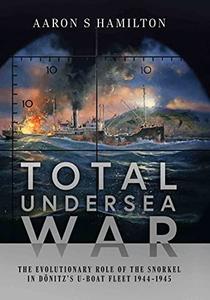Total Undersea War The Evolutionary Role of the Snorkel in Donitz's U-boat Fleet 1944-1945
- Книги
- 29-06-2023, 05:25
- 103
- 0
- voska89

Free Download Aaron S Hamilton, "Total Undersea War: The Evolutionary Role of the Snorkel in Donitz's U-boat Fleet 1944-1945"
English | 2020 | pages: 400 | ISBN: 1526778807 | EPUB | 7,1 mb
During the last year of World War II the once surface-bound diesel-electric U-boat ushered in the age of 'total undersea war' with the introduction of an air mast, or 'snorkel' as it became known among the men who served in Doenitz's submarine fleet. U-boats no longer needed to surface to charge batteries or refresh air; they rarely communicated with their command, operating silently and alone among the shallow coastal waters of the United Kingdom and across to North America. At first, U-boats could remain submerged continuously for a few days, then a few weeks, and finally for months at a time, and they set underwater endurance records not broken for nearly a quarter of a century. The introduction of the snorkel was of paramount concern to the Allies, who strived to frustrate the impact of the device before war's end. Every subsequent wartime U-boat innovation was subordinated to the snorkel, including the new Type XXI Electro-boat wonder weapon'. The snorkel's introduction foreshadowed the nearly un-trackable weapon and instrument of intelligence that the submarine became in the postwar world.
It provides answers to many long-standing questions about the last year of the war: How and why did U-boats patrol so close inshore? How effective was acoustic and anti-radar camouflage? Why was U-boat wireless communication so problematic? How did U-boats navigate so effectively submerged? What were the health implications of staying submerged for a month or more? What does an accurate snorkel-configuration look like?
This previously unpublished historical data is applied to a maritime archaeological case study about how the snorkel-equipped U-869 likely met its demise off the US East Coast in February 1945. The theory that emerges based on a precise understanding of late-war snorkel operations is new and compelling.
This exhaustive study, the first of its kind, draws upon wartime documents from archives around the world to re-evaluate the last year of the U-boat's deployment, all its key technological innovations, the evolving operations and tactics, and Allied countermeasures. It is destined to become an authoritative reference on late-war U-boat development for historians and maritime archaeologists alike for years to come.
Links are Interchangeable - Single Extraction
